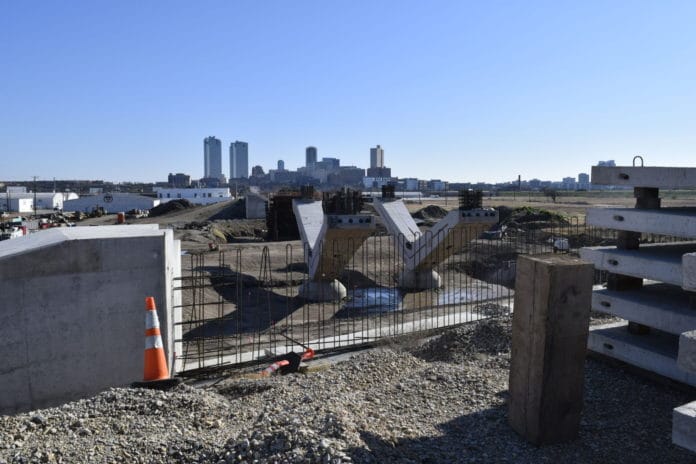Fort Worth’s Panther Island project has been left off the Trump administration’s 2020 budget list of flood control and water projects seeking federal funding, a spokesman for the U.S. Army Corps of Engineers told the Fort Worth Business Press April 4.
The Army Corps of Engineers endorsed the $1.16 billion project as worthy of federal funding in 2016, paving the way for Panther Island, also known as the Central City project, to receive $526 million in federal dollars.
“While the project was not included in the administration’s fiscal year 2020 Civil Works budget, the Central City project is one of the many important projects around the nation that are eligible to be considered for funding in the fiscal year 2020 Energy and Water appropriations,” Army Corps spokesman Gene Pawlik wrote in an email.
“It would be inappropriate for the (Army Corps of Engineers) to speculate on what Congress might include in that legislation when passed,” wrote Pawlik, a spokesman at the Corps’ headquarters in Washington, D.C.
If Congress fails to include Panther Island in its appropriations package, 2020 could be the fourth funding cycle that it would be shunned.
“It is the intention of (the Corps) to complete all projects for which construction has begun,” Pawlik said.
The ambitious project involves digging a 1.5-mile bypass channel on the Trinity River north of the Tarrant County Courthouse. That strategy is intended to add flood control protection as well as carving out an 800-acre center island, which would create waterfront economic development opportunities.
The project has received about $60.5 million from the Corps budget for this project, although it has received additional transportation funds for construction of three uncompleted bridges that would connect the mainland to the island.
The project’s managing agency, the Trinity River Vision Authority, an offshoot of the Tarrant Regional Water District, has budgeted $26 million in federal funding to keep the project afloat in 2020 and another $35 million federal dollars for 2021.
About $324 million in local tax money has already been spent on the project. A $200 million loan from the TRWD to the project is about to run out, TRWD Finance District Sandy Newby reported to the TRVA and TRWD boards recently.
Fort Worth Rep. Kay Granger, now the ranking member of the powerful House Appropriations Committee, has been working feverishly to get federal funds for the project in the 2020 appropriations.
Whether that happens remains to be seen.
At a March 27 hearing of the House Appropriations Subcommittee on Energy and Water Development, the committee heard testimony on the administration’s budget, which cuts 31 percent from Army Corps funding in 2020.
“Unfortunately, the budget request is woefully inadequate to address the challenges before us,” committee chair Marcy Kaptur, D-Ohio, said in a statement “It slashes funding for the Corps and the Bureau (of Reclamation) by nearly a third each from 2019 levels.”
The administration’s 2020 budget dedicates $4.8 billion in funding for civil works projects, according to the Corps.
But at that March 27 subcommittee hearing, top officials of the Corps and Rep. Mike Simpson, R-Idaho, the ranking member of the subcommittee, all expressed support for the Fort Worth project.
“I strongly support the project and I’m not sure the administration doesn’t support the project,” said R.D. James, Assistant Secretary of the Army for Civil Works, Army Corps.
Granger said in a statement that she is committed to securing federal funds for the project.
“The Central City project is my top priority; it is vital to the future of Fort Worth,” Granger stated. “Assistant Secretary of the Army, R.D. James, expressed his strong support of the project and the Army Corps of Engineers committed to completing Central City.”
James also mentioned the possible need for additional authorization for the project. “At this time, I don’t know of any,” he said.
The project has never undergone a cost-benefit analysis, a customary procedure for obtaining Corps authorization and funding. Trinity River Vision Executive Director J.D. Granger has repeatedly stated that the need for an analysis was waived by Congress and the project received full authorization from the Corps.
Yet, the absent cost-benefit analysis and other issues, including the fact that Kay and J.D. Granger are mother and son, continue to haunt the project in Fort Worth.
Critics have nicknamed the project “The Boondoggle.”
Fort Worth Mayor Betsy Price met with federal Management and Budget officials during a trip to Washington last fall, where she said she learned the project doesn’t qualify for Corps funds because it is an economic development venture.
Price demanded a comprehensive review of the project, which the TRV board launched in December. Only one consulting firm bid to conduct the “programmatic review.”
TRV board cancelled its March meeting and its regularly scheduled April meeting so the review has not moved forward. The TRV board meeting is apparently due to be reset during the week of April 7.
Should the project again fail to receive federal funds, officials plan to tap bond funds from a $250 million bond issue approved by TRWD voters last year. A caveat to that bond issue is an increase of 40 to 50 years to repay those bonds.
Only the Fort Worth City Council can approve that 10-year increase of the tax-increment financing district, which supports Panther Island development in Fort Worth.
Price and some Council members want the programmatic review completed before increasing the TIF repayment term.






